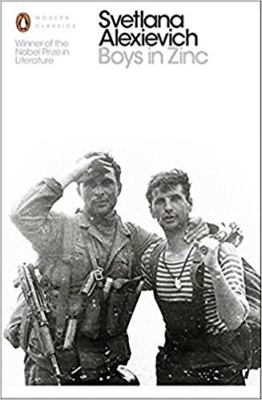Book: 'Boys in Zinc' by Svetlana Alexievich

Svetlana Alexievich is a Belorussian journalist whose mission is to tell the truth about war, and the human condition. For this reason alone, she deserves the attention of readers of Independent Catholic News. Her book about the Soviet occupation of Afghanistan, 'Boys in Zinc,' has just been published in English for the first time, a welcome development for those of us who were unaware of her work before she won the Nobel Prize for Literature in 2015.
Alexievich interviewed dozens of soldiers who served during the 1980s, cataloguing the horrors they experienced at the hands of Afghans who did not want their fraternal, socialist “help.” The soldiers, most of whom were barely out of their teens, were led to believe they would be welcomed. Their bewilderment and fear soon turned to brutality: whole villages laid to waste, civilians massacred, and homes looted. Readers may find the Soviet soldiers’ stories echo the experiences of Americans in Vietnam and South Africans serving in Angola and Mozambique during the Cold War. Drug abuse, boredom, loneliness, and terror punctuate each beautifully written paragraph.
Alexievich interviewed medics who worked around the clock in unspeakable conditions to save the lives of Afghan civilians, only to be spat at by their patients. If a little girl accepted candies from a Russian soldier, the Afghan guerrillas amputated her hands as a warning to others not to fraternize with the occupying army.
Equally alarming is the Soviet officers’ disregard for their soldiers’ health or safety. They were transported in planes driven by pilots who were literally staggering drunk; the hospitals had little in the way or medicine or basic supplies; and soldiers were fed from tins of food that had expired 25 years before. Officers sold their units’ military equipment to the enemy, stripped the possessions off dead soldiers, and turned a blind eye to bullying and theft within battalions.
Wounded soldiers returned home to families who believed the Soviet propaganda about military success and friendly Afghans. Traumatized and neglected, the soldiers met indifference or contempt from those who had avoided service.
Most disturbing and painful are Alexievich’s interviews with the mothers of soldiers who never came home. Their agony was made worse by the brutality of their treatment by officialdom. Remains were sealed in zinc coffins and dumped in the courtyards of parents’ apartment blocks or behind sheds at airports. Once it was clear there would be no victory in Afghanistan, the fallen became an embarrassment, rather than heroes.
Alexievich felt she had a duty to tell the mothers’ desperate, yet tender stories. However, by the 1990s the same forces now running Russia fomented a backlash against her truth-telling. The final quarter of the book details the legal proceedings against the journalist, instigated because she challenged the popular notion that Russia is still all-powerful and that its recent history is glorious. The persecution of Alexievich reveals the mindset of those in the Kremlin, and their millions of supporters who prefer lies rather than facts.
We must hope the international fame brought by the Nobel award will protect Alexievich from the fate awaiting too many other brave journalists, trying to work in modern Russia.
For more information see: www.penguin.co.uk/books/295485/boys-in-zinc/















